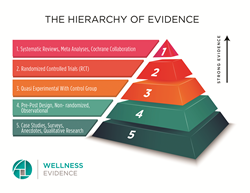
Since the launch of WellnessEvidence.com, the GWI’s researchers have made it their mission to help individuals sift through thousands of clinical studies as they seek solutions to health issues.
People are seeking evidence for the best immunity weapons, but fear has also made us vulnerable to the barrage of online ads for ‘miracle’ supplements, superfoods, tonics, vitamins, essential oils and potions that claim to prevent or treat COVID-19.
MIAMI (PRWEB)
April 01, 2020
The Global Wellness Institute™ (GWI), a 501(c)(3) nonprofit organization with a mission to empower wellness worldwide, reminds wellness seekers that there is evidence-based, medical research available on mainstream wellness modalities. Since the launch of WellnessEvidence.com in 2015, the GWI’s researchers have made it their mission to help individuals more easily sift through thousands of clinical studies as they seek solutions to health issues. All GWI’s resources are absolutely free, including its bi-monthly newsletter, the “Global Wellness Brief,” which includes important insights and information on wellness evidence.
WellnessEvidence.com provides easy access to, and key summaries of, clinical studies on numerous wellness modalities that appear in the world’s most authoritative sources of evidence-based medicine, including Natural Medicines, the Cochrane Library, PubMed and the TRIP Database.
“Online searches on how to bolster immunity and cope with rising stress/anxiety have surged during the Coronavirus crisis,” said Susie Ellis, chair and CEO of the GWI. “People are seeking evidence for the best immunity weapons, but fear has also made us vulnerable to the barrage of online ads for ‘miracle’ supplements, superfoods, tonics, vitamins, essential oils and potions that claim to prevent or treat COVID-19.”
Governments and private businesses are also taking action on the avalanche of health and wellness misinformation. For example, in the US, the FDA recently sent warning letters to companies selling wellness teas, aromatherapy oils, tinctures and colloidal silver, as there is no evidence they can prevent or cure Coronavirus. Twitter is pulling down tweets for products/approaches “known to be ineffective or not applicable in the COVID-19 context.”
“I’ve watched with great pride at how our industry is committed to giving consumers much access to wellness while practicing physical distancing during these stressful times,” said Ellis. “I encourage everyone to add Wellness Evidence to their ‘wellness toolkit,’ as it not only provides access to the same databases doctors use when evaluating alternative or complementary medicine, it also simplifies searches for common wellness modalities. It is a much-needed, ‘spin-free’ wellness research zone.”
GWI researchers provided these examples of wellness modalities reviewed on WellnessEvidence.com:
-
Is exercise an immunity booster? Yes, WellnessEvidence.com features a recent meta-review that shows wide-ranging immune system benefits, while a direct search of the PubMed database alone shows over 5,000 studies on exercise and the immune system. - Does sleep impact the immune system? Yes, many studies have been conducted on this issue (PubMed alone shows more than 3,000 search results), and numerous studies reveal how poor sleep hurts adaptive immunity. A recent NCBI trial indicates that just one bad night of sleep can reduce immune cells by up to 70 percent.
- Does stress weaken your immune response? Yes, and long-term studies at Carnegie Mellon University have even shown that people exposed to cold viruses that reported less stress were significantly less likely to develop symptoms.
- Does an optimistic attitude impact the immune response? Many studies say yes, with a University College London trial finding a strong positive association between optimism and antibody responses.
- Does aromatherapy, such as lavender and lemon oil, improve immune status? While some smaller studies suggest aromatherapy can help with stress and sleep, one of the more rigorous studies from Ohio State University showed no immune impact.
GWI also recently launched PositivelyWell, a movement to replace fear with a focus on wellness. PositivelyWell encourages people around the world to build strong immune systems through exercise, healthy nutrition, stress reduction, smoking cessation, optimism and more. In addition, it features encouraging and timely news on immunity issues as well as quotes from wellness leaders across the globe on how they are replacing fear with a focus on wellness.
About the Global Wellness Institute: The Global Wellness Institute™ (GWI), a 501(c)(3) nonprofit organization, is the leading research and educational resource for the global wellness economy. Through its five pillars—research, industry initiatives, roundtable discussions, Wellness Evidence and The Wellness Moonshot: A World Free of Preventable Disease—the GWI informs and connects key global stakeholders who impact the health and wellness of our planet and its citizens. The GWI’s mission is to empower wellness worldwide.
Share article on social media or email:

